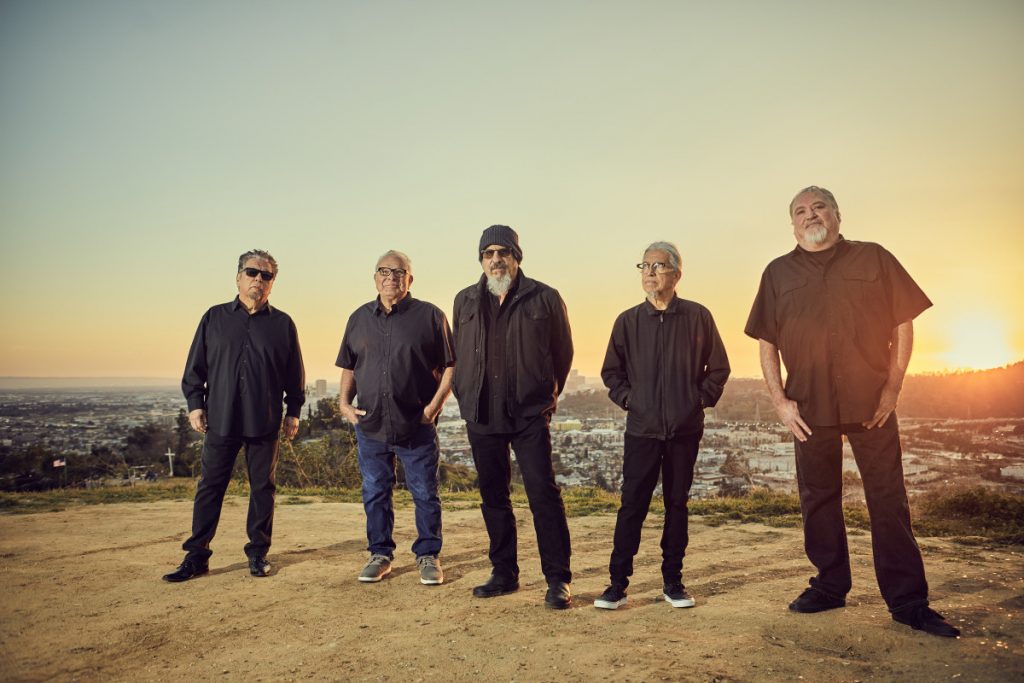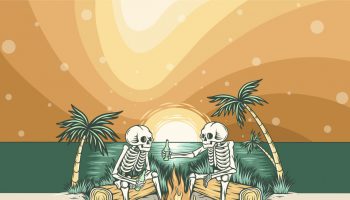
Liz Delillo
Staff writer
Legendary Mexican-American rock band Los Lobos take the stage at 8:15 p.m. tonight in the Amphitheater.
The East L.A. rock band Los Lobos comprises original founding members Louie Pérez, Steve Berlin, Cesar Rosas, Conrad Lozano and David Hidalgo. They met at James Garfield High School in East Los Angeles and returned to their alma mater in 2023, selling out the auditorium for their 50th anniversary as a band.
They have received four Grammy Awards, the Latin Grammy Lifetime Achievement Award and have been named as a National Endowment for the Arts National Heritage Fellow. Los Lobos was inducted into the California Hall of Fame, the Austin City Limits Hall of Fame and was nominated for induction into the Rock and Roll Hall of Fame in 2015. Their documentary “Native Sons,” named after their album, is scheduled to premiere this year.
Most Chautauquans may recognize Los Lobos from their chart-topping cover of “La Bamba.” It was featured in the 1987 film of the same name, following the life and career of Ritchie Valens, who famously covered the song in 1958.
Berlin spoke with MAGNET in 2021 about their approach when covering songs.
“We grew up in the radio era, so usually the songs we cover are part of our DNA. So there’s a lot of love and respect,” Berlin told MAGNET. “And covers are fun, what can I say? People are rarely displeased when we pull one out — no matter how stupid it is.”
Los Lobos’ music spans a wide array of musical traditions such as rock and roll, soul, R&B, jazz, blues and folk. In a 2023 interview with Ian Stewart on radio station KCRW, Rosas described how Los Lobos began incorporating more genres into their music.
“You got to understand we were rock ‘n’ roll guys first — we’re rocking out, we all had rock bands and stuff — then I got into the folk music for a second there. I invited all my homies over, and we started the band — Los Lobos,” Rosas said on KCRW. “We got interested in Mexican folk music because that’s the music of our parents. (It’s) our heritage, and it just felt good to do it.”
With the same name as their 2002 album Good Morning Aztlán, Pérez’s musical memoir delves into their artistry deeply and explores it through various media. “Aztlán” refers to the ancestral homeland of the Mexica people in Aztec mythology. In a 2019 interview with Adam Perry for Westword, Pérez elaborated how the term “encompasses a lot of things.”
“It’s not some metaphysical thing; it’s just really the truth, because for Mexican-American kids like us in East L.A. that grew up there, it means something because we weren’t ever really accepted in Mexico,” Pérez said in Westword. “It was, ‘What are you?’ They never considered us really Mexicans. Then over here in the United States, we were never accepted as Americans.”
Delving into that space “in between” Mexican and American identities — a concept Chicana scholar Gloria Anzaldúa coined as “Borderlands” — Pérez shared how “Aztlán” encompasses Los Lobos’ kinship.
“So what do you do when you don’t belong anywhere? If you have the right attitude and the right perspective, you belong everywhere,” Pérez said in his interview with Perry.
“We’ve been everywhere and done everything, and I’d say we get respect from people all over,” Pérez said. “And the music we play is nothing like anybody would expect. And we’re still maintaining the core of who we are, if you know what I mean. We have never smoothed over or censored ourselves; we’re Mexican-American guys from East L.A., and we write about it, too.”
Pérez shed light on the outward orientation of their artistic expression in a 2019 NPR interview with Felix Contreras.
“What I experienced when I saw America and I saw all of those different parts and how they all fit together — and they all fit together because they all had a commonality and something that made them all alike — that’s the way I approached things,” Pérez told Contreras. “I wanted to drive that home in the songs that I wrote. So everything I approached in that way so that people can interpret it into their own lives, no matter what color you are. … We’re all the same kind of people, no matter what.”




